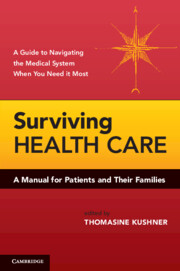Book contents
- Frontmatter
- Contents
- Contributors
- Preface
- 1 Letter to Patients
- 2 Becoming an Active Member of Your Health Care Team
- 3 Information That Will Help You with Advance Planning for Your Health Care
- 4 Responding to Medical Emergencies
- 5 What You Need to Know about Medical Errors
- 6 Being Informed When You Give Consent to Medical Care
- 7 Beware of Scorecards
- 8 Transplantation 101
- 9 When the Illness Is Psychiatric
- 10 On the Horizon
- 11 To Be or Not to Be – A Research Subject
- 12 Information That Will Help You Make Health Care Decisions for Adult Family Members
- 13 Caring for Individuals with Alzheimer's Disease
- 14 When the Patient Is a Child
- 15 Care of Elders
- 16 Being and Thinking
- 17 A Patient's Guide to Pain Management
- 18 The Hardest Decisions
- 19 What You Need to Know about Disasters
- 20 Making the Internet Work for You
- Appendix: Patient Individual Profile
- Index
5 - What You Need to Know about Medical Errors
Published online by Cambridge University Press: 05 June 2012
- Frontmatter
- Contents
- Contributors
- Preface
- 1 Letter to Patients
- 2 Becoming an Active Member of Your Health Care Team
- 3 Information That Will Help You with Advance Planning for Your Health Care
- 4 Responding to Medical Emergencies
- 5 What You Need to Know about Medical Errors
- 6 Being Informed When You Give Consent to Medical Care
- 7 Beware of Scorecards
- 8 Transplantation 101
- 9 When the Illness Is Psychiatric
- 10 On the Horizon
- 11 To Be or Not to Be – A Research Subject
- 12 Information That Will Help You Make Health Care Decisions for Adult Family Members
- 13 Caring for Individuals with Alzheimer's Disease
- 14 When the Patient Is a Child
- 15 Care of Elders
- 16 Being and Thinking
- 17 A Patient's Guide to Pain Management
- 18 The Hardest Decisions
- 19 What You Need to Know about Disasters
- 20 Making the Internet Work for You
- Appendix: Patient Individual Profile
- Index
Summary
Recent studies have found that errors occur commonly in medical practice. Errors in medical care can be dangerous and may result in permanent damage or death. One study reported that the number of patients who die daily in the United States as a result of medical errors is equivalent to the number who would die if a jumbo jet crashed every day. We are all aware of every crash of a jumbo jet, but few people are aware of the incidence of medical errors. That is because, unlike plane crash deaths, which occur all at once in a horrific drama, bad outcomes from medical errors happen one at a time, often days or weeks after the error occurs, and in the relative privacy of homes and hospitals across the country. This chapter explains how and why errors happen and offers practical advice to help protect you from becoming the victim of a medical error.
The Nature of Medicine
The Uncertainty of Medicine
Humans are biologically complex, and each of us is unique. Although high school biology classes and even medical textbooks present human anatomy and physiology as identical, in fact, no two humans are exactly alike, not even identical twins. We vary in our susceptibility and reactions to disease, as well as in our responses to the environment and to treatment.
- Type
- Chapter
- Information
- Surviving Health CareA Manual for Patients and Their Families, pp. 56 - 68Publisher: Cambridge University PressPrint publication year: 2010

